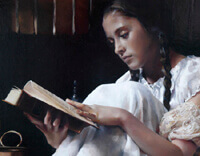Lisa and Lottie by Erich Kastner
By Al R. Young
 |
| Reading List |
While many scholars rightly feel that learning German is worth the time if only to read Goethe in the original, we go a step farther with the justification: Learning German would be worthwhile simply to be able to read Kastner in the original.
His crafty wit sparkles in his native tongue. Fortunately, however, Lisa and Lottie (Das Doppelte Lottchen) translates well and very enjoyably.
Set in postwar Austria and Germany, it tells the story of twin girls, Lisa Palfy and Lottie Horn, separated as toddlers by their divorcing parents. Each twin is unaware of the other's existence until an accidental meeting at summer camp. (If this sounds familiar, you're right. It's the basis for Disney's twin films: The Parent Trap and The Parent Trap.)
Initially unfriendly, then inseparable, the two girls connive to exchange places and sense the life, and especially the parent, known only to the other. Lisa heads off to Munich, in her guise as Lottie, to be the "little housekeeper" for her Mother, Lisalott Horn, who works for Munich Illustrated. Lottie, now Lisa, travels to Vienna to live with Arnold Palfy, a renowned and somewhat moody conductor and composer.
In seven years of separation, neither parent has remarried. Enter the sophisticated Irene Gerlach and her wiles ...
This is a quick-witty-tender-and-touching read. It's great not only for family reading, but for the 7- to 9-year-old girl who is ready for an absorbing foray into a book all her own. And since it's had at least two motion pictures based on it, the experience of reading the original can help develop a child's ability to critique literature in various media, and so make skilled judgements about the use of leisure time.
Tags: 2010, Book reviews
Browse articles by year: 2025 . 2024 . 2023 . 2022 . 2021 . 2020 . 2019 . 2018 . 2017 . 2016 . 2015 . 2014 . 2013 . 2012 . 2011 . 2010 . 2009 . 2008 . 2007 . 2006 . 2005 . 2004 . 2003 . 2002 . 2001 . 2000 . 1999 . 1998 . 1997 . 1996
Browse articles by topic: Art lessons . BenHaven Archives . Blank art diaries . Fine art photography . Framing . Illustration . Inspiration and creativity . Isles of Rune . Limited Editions Collection . My Fathers Captivity . News . Novellas . Oil paintings and prints . Operations announcements . Orders and shipping . Overview . Portfolios . The Papers of Seymore Wainscott . Project commentaries . Recipes by Nancy Young . Recommended reading . Recommended viewing . Temple artworks . The Storybook Home Journal . Tips and techniques . Tools supplies and operations
Browse articles by topic: Art lessons . BenHaven Archives . Blank art diaries . Fine art photography . Framing . Illustration . Inspiration and creativity . Isles of Rune . Limited Editions Collection . My Fathers Captivity . News . Novellas . Oil paintings and prints . Operations announcements . Orders and shipping . Overview . Portfolios . The Papers of Seymore Wainscott . Project commentaries . Recipes by Nancy Young . Recommended reading . Recommended viewing . Temple artworks . The Storybook Home Journal . Tips and techniques . Tools supplies and operations